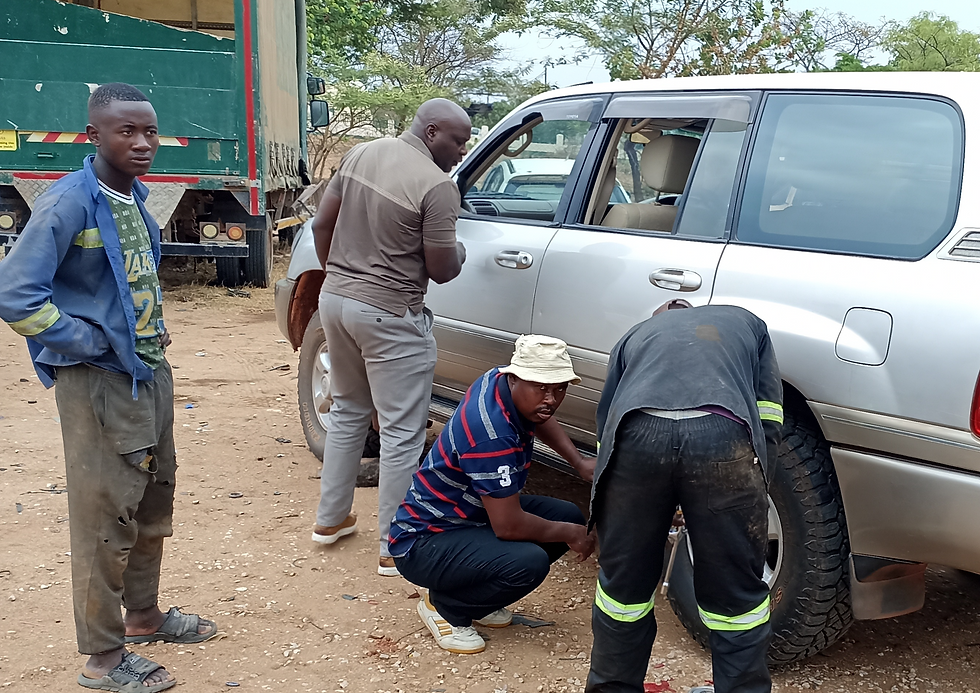A Pebble in our Shoe at St Thomas
- sandyelsworth
- Nov 14, 2025
- 4 min read

Leaving Kwekwe finally is always bittersweet: saying goodbye to the farm and the people and the magnificent flamboyants which welcome the traveler and burn with colour, but knowing that we are homeward bound. We left early, with coffee in the flasks, enjoying the relatively smooth tar through Chegutu and Chinhoyi and Karoi towards our destination in Magunje, past huge empty grain silos. Along the way we pulled over for a coffee refill at Saucy Sue's a very comfortable garden stop at Lion's Den. Steve, my traveling companion, being a carpenter was enraptured by the wood patterns in the tables and benches, and ended up buying a cord of firewood from offcuts for $5 to bring back to England! Not sure how we will explain this to customs officials at Gatwick if stopped... We were joined by Artwell and Rev Ncube Lemias and continued through to Magunje on the Binga road.
The church of St Thomas is located close to the main centre of the market town, down dirt roads winding through the houses. The Mothers Union representatives in their bright blue and white regalia, and some community people were there to welcome us.
The borehole was completed earlier this year by Rockwell Drilling, and Forster completed the pump, solar and storage installation in May. Testing confirmed, once again, a prolific output which more than meets the current needs of the church and surrounding community. The church has made a cage to protect the borehole meter and valves from damage, and all appeared to be in good order.

Being in the town, however, means that the churchyard is open to wandering donkeys and goats and children etc. who can amble in and enjoy the vegetables and fruit now being grown in the garden. Clearly the provision of secure fencing is the primary issue. The community tap is located off the dirt road on the church ground, but there are concerns about security and privacy, so this is tap is currently only made accessible to the community in the morning and late afternoons, otherwise it is locked. We discussed rearranging the security fence such that the tap can be permanently open to the road and community, and this was agreed - particularly given the abundance of water at the source. A small contribution from TZABA was left with the Treasurer towards this purpose.

I must celebrate the work being done by Mrs Madamombe, the Churchwarden and head of MU, Mrs Tondoro and Mrs Mavis Johns, the Treasurer. Sometimes I do feel that it is the women who are key to managing and developing the water sources, most probably because they are typically the ones who collect the water, and who work in the vegetable gardens providing the food. They not only carry the burden of family and community needs but can also sing and dance the men off their feet! Let's celebrate women: the sustainers of our families. Thank you all.
As we left, the rear wheel was producing a rattling sound when brakes were being applied. A bit concerning given the distance we needed to travel to return to Harare. We pulled over into a roadside garage, a bit apprehensively - essentially an area of dirt covered with grease and oil and an assortment of dead or dying vehicles. But Rev jumped out and enthusiastically greeted the mechanic fiddling with an engine, assuring us that he was the one who would be fully capable of sorting out this sound as he knew him.

I am pleased to report that indeed, he was very efficient and knowledgeable, and after 15 minutes he had removed the wheel, hub and brake assembly, extracted a small stone, and refitted all - for $10. We were most impressed, given the challenges of the situations in the dust and oil. We shared our apples, and soon were back on the road with relief.
A small stone, and a rattle. Everywhere I've traveled in the country I raise my questions to challenge in a small way the established order of the church and society. One question relates to the encouragement to teach science in schools, particularly evolutionary science. But the second deals with the role of women in society and the church. I ask the priests and bishops: when will we see a woman ordained in the country, and fully recognised as equal to a man? What has been exciting is that some of the Provinces have now accepted the the ordination of women, including the Diocese of Masvingo and Harare.

I see women doing the hard work in the fields, collecting the water, cooking and cleaning, managing the children and the family, and then selling the vegetables at the roadside market. They are mothers and grandmothers, churchwardens and treasurers, readers and deacons, administrators and organisers. These are the stones on which much of this country is built and on which it grows and thrives. I salute you all, and thank you, Mrs Madamombe, Mrs Tabarikwa at Gokwe, Sister Moreblessing, Mrs Chimhou and all the Mothers Union for the work you do and the love and care you put into the community. May that small stone, that rattle, bring change and hope and love to all.
Thank you for reading.
Sandy




Comments